02:00
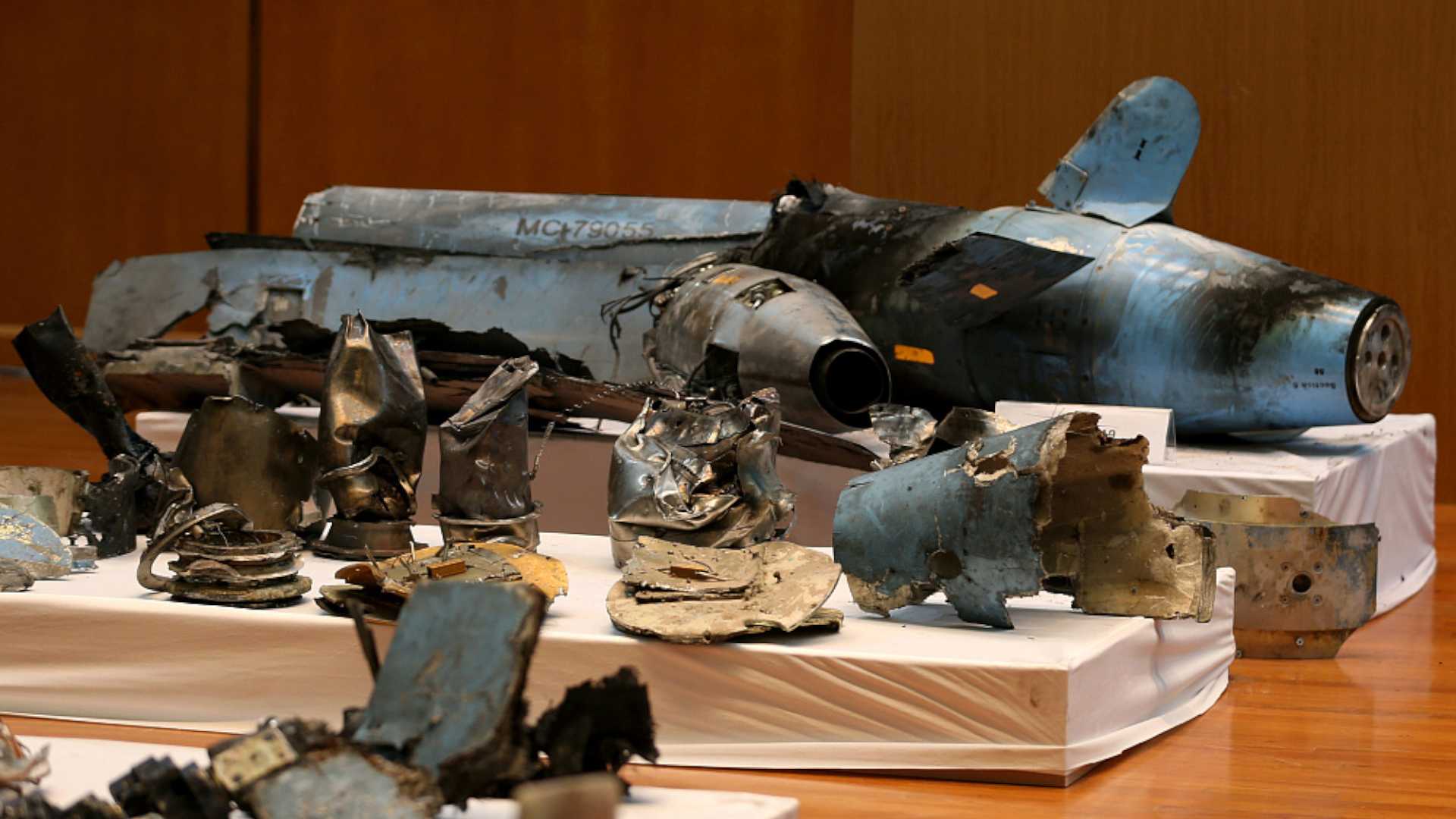
U.S. President Donald Trump said on Wednesday there were many options short of war with Iran after Saudi Arabia displayed remnants of drones and missiles which it said were used in a crippling attack on its oil facilities that was "unquestionably sponsored" by Tehran.
"There are many options. There's the ultimate option and there are options that are a lot less than that. And we'll see," Trump told reporters in Los Angeles. "I'm saying the ultimate option meaning go in – war."
Trump, who earlier said on Twitter that he had ordered the U.S. Treasury to "substantially increase sanctions on the country of Iran!" told reporters the unspecified, punitive economic measures would be unveiled within 48 hours.
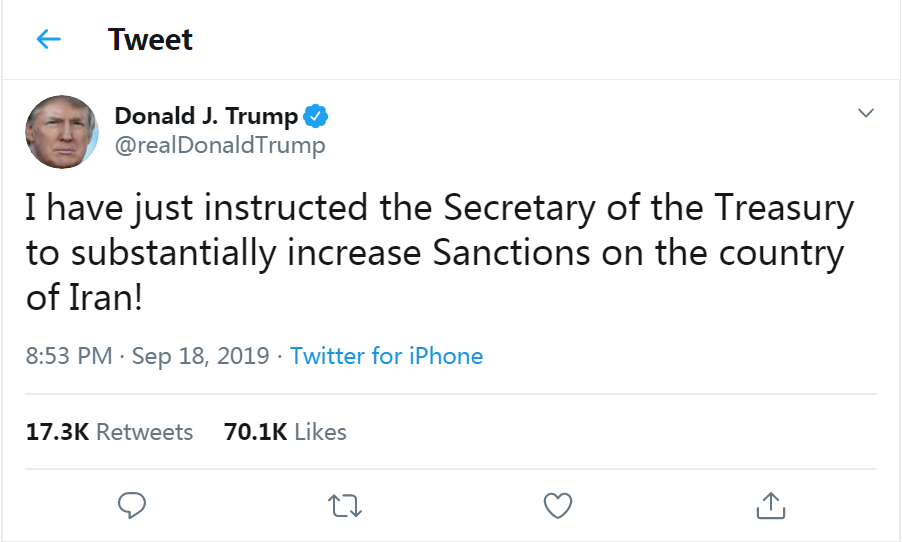
Trump's tweet followed repeated U.S. assertions that the Islamic Republic was behind Saturday's attacks and came hours after Saudi Arabia said the strike was a "test of global will."
Iran dismissed the allegations
Iran again denied involvement in the September 14 raids, and backed Houthi claims of being behind the attack, and Iranian President Hassan Rouhani said Wednesday it was a rebel "warning" about a possible wider war in response to the Saudi-led intervention in Yemen.
"They want to impose maximum ... pressure on Iran through slander," Rouhani said.
"We don't want conflict in the region ... Who started the conflict?" he added, blaming Washington and its Gulf allies for the war in Yemen.
Iranian Foreign Minister Mohammad Javad Zarif said Wednesday the newly announced sanctions showed the U.S. was aiming at civilians. President Trump's move was an admission that the U.S. is "deliberately targeting ordinary citizens," Zarif wrote on Twitter, adding the measures were "illegal" and "inhuman."
State media said Tehran had written to Washington through the Swiss embassy on Monday, denying any role in attacks on Saudi installations and warning it would respond to any action against it.
Trump's administration is considering responses including a cyber-attack or a physical strike on Iranian oil infrastructure or its Revolutionary Guards, NBC News reported, citing unnamed U.S. officials.
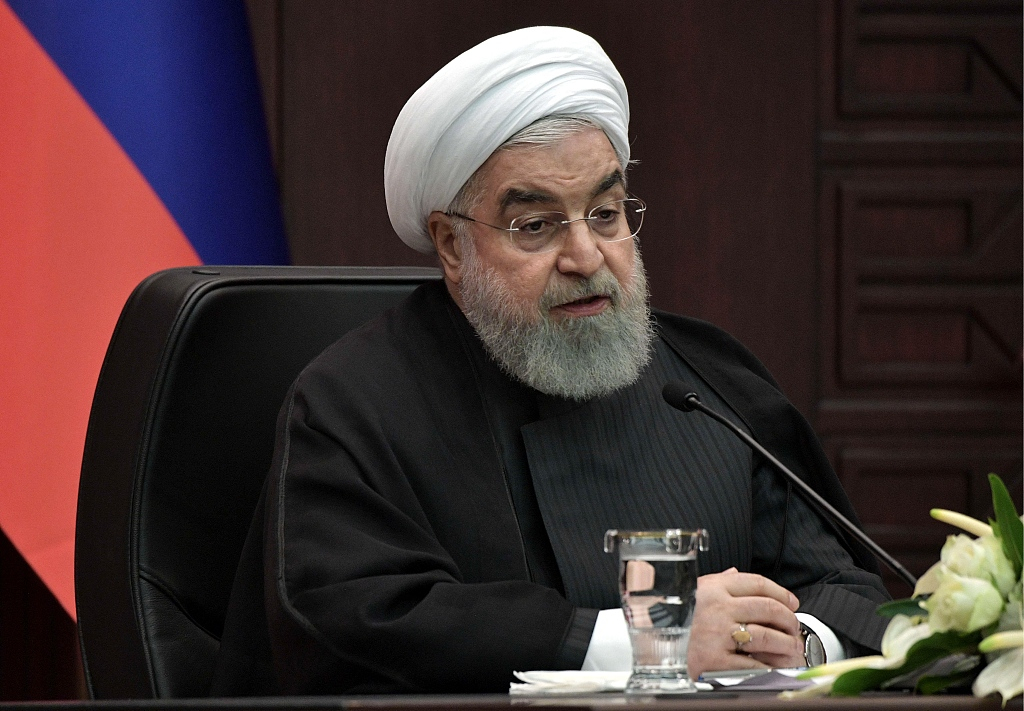
Iran's President Hassan Rouhani at a joint press conference following the fifth trilateral summit between Iran, Turkey and Russia to discuss prospects for Syrian peace process, September 16, 2019. /VCG Photo
Iran's President Hassan Rouhani at a joint press conference following the fifth trilateral summit between Iran, Turkey and Russia to discuss prospects for Syrian peace process, September 16, 2019. /VCG Photo
Read more:
Iran says U.S. should abandon 'maximum pressure' policy
Responsibility was claimed by Yemen's Iran-aligned Houthi group, which on Wednesday gave more details of the raid, saying it was launched from three sites in Yemen.
In a remark that may further strain an already tense political atmosphere in the Gulf, the Houthis also said they had dozens of sites in the United Arab Emirates, Riyadh's top Arab ally, listed as possible targets for attacks.
All pointing at Iran
In an attempt to bolster its assertion that Iran was responsible, Saudi Arabia showed drone and missile debris it said amounted to undeniable evidence of Iranian aggression.
A total of 25 drones and missiles were used in the attacks sponsored by Iran but not launched from Yemen, Defense Ministry spokesperson Colonel Turki al-Malki told a news conference.
The attack was launched from the north and unquestionably sponsored by Iran," he said, adding Iranian Delta Wing unmanned aerial vehicles (UAV) were used in addition to cruise missiles.
An investigation into the origin of the attacks was still underway and the result will be announced later, he said.
A U.S. official said on Tuesday the strikes originated in southwestern Iran. Three officials said they involved cruise missiles and drones, indicating a higher degree of complexity and sophistication than initially thought.
The officials did not provide evidence or explain what U.S. intelligence they were using for evaluating the attack.
Proof of Iranian responsibility, and in particular firm evidence that the attack was launched from Iranian territory, could pressure Riyadh and Washington into a response. Both nations, however, were stressing the need for caution.
The raid exposed the vulnerability of Saudi Arabia's oil infrastructure and threw down a gauntlet to the United States, which wants to curb Iranian influence in the region.
"The attack is like September 11 for Saudi Arabia, it is a game changer," said one Saudi security analyst.
Saudi Arabia's finance minister said the attack had no impact on revenues and Aramco was continuing to supply markets without interruption.
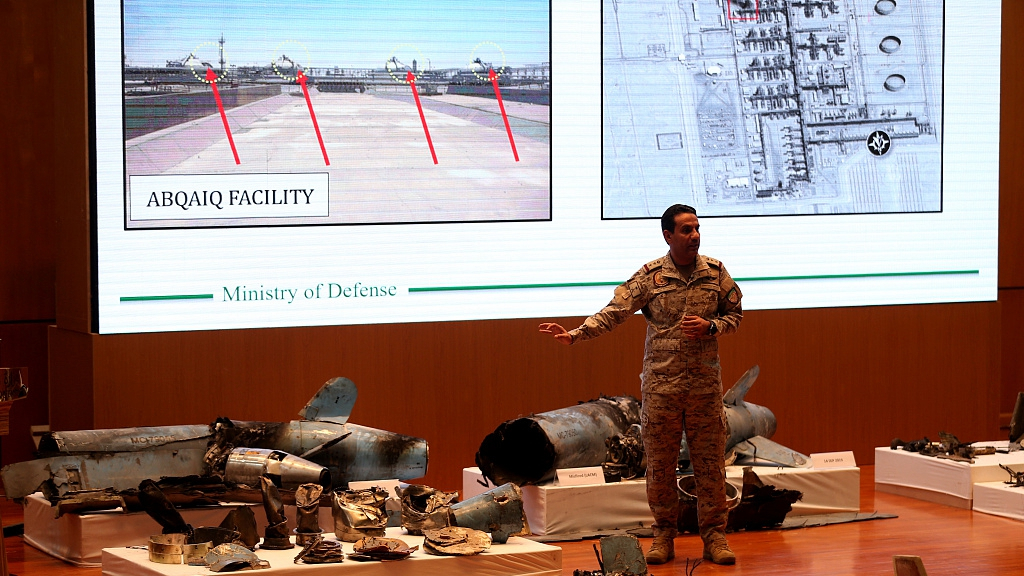
Saudi defense ministry spokesman Colonel Turki Al-Malik displays remains of the missiles which Saudi government says were used to attack an Aramco oil facility, during a news conference in Riyadh, Saudi Arabia, September 18, 2019. /VCG Photo
Saudi defense ministry spokesman Colonel Turki Al-Malik displays remains of the missiles which Saudi government says were used to attack an Aramco oil facility, during a news conference in Riyadh, Saudi Arabia, September 18, 2019. /VCG Photo
Pompeo: It was an act of war against Saudi Arabia
U.S. Secretary of State Mike Pompeo, who met Prince Mohammed in Jeddah to discuss the crisis, said the attacks would be a major focus of next week's annual U.N. General Assembly meeting and suggested Saudi Arabia could make its case there.
Pompeo called the attacks "an act of war."
"The Saudis were the nation that was attacked. It was on their soil. It was an act of war against them directly, and I'm confident they will do that," he told reporters before meeting the Saudi crown prince.
Pompeo said there was no evidence for media reports the attacks had been launched from Iraq.
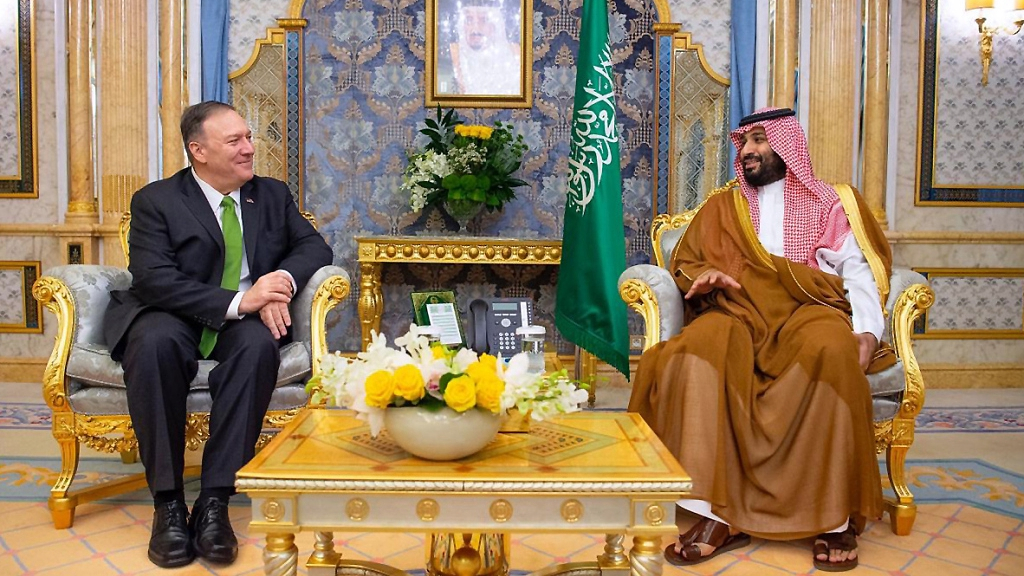
U.S. Secretary of State Mike Pompeo (L) meets with Saudi Arabia's Crown Prince Mohammed bin Salman in Jeddah, September 18, 2019. /VCG Photo
U.S. Secretary of State Mike Pompeo (L) meets with Saudi Arabia's Crown Prince Mohammed bin Salman in Jeddah, September 18, 2019. /VCG Photo
Crown Prince Mohammed bin Salman said the strike was a "real test of the global will" to confront subversion of the international order.
Vice President Mike Pence reiterated Trump's comments that "we don't want war with anybody, but the United States is prepared."
"I certainly hope we're not" going to have a war, Riyadh's ambassador to London Prince Khalid bin Bandar told the BBC. "We are trying not to react too quickly because the last thing we need is more conflict in the region."
World reactions
U.N. officials monitoring sanctions on Iran and Yemen were also heading to Saudi Arabia to investigate. Secretary-General Antonio Guterres said a major confrontation in the Gulf would have "devastating consequences" for the region and globally.
France, which is trying to salvage an international nuclear deal with Iran that Washington quit last year, said it wanted to establish the facts before reacting.
Russian President Vladimir Putin, who has offered to sell defense systems to Riyadh, called for a "thorough and impartial" probe during a phone call with Prince Mohammed.
Iran-U.S. conflict
The 2015 nuclear deal ushered in a brief detente in long hostile relations between Iran and the United States. But antagonism returned when Trump pulled out of the pact, reached before he took office, and reimposed sanctions, severely damaging the Iranian economy. Iran has ruled out talks with Washington unless it returns to the pact.
U.S. sanctions imposed on Iran in June built on a series of previous ones.
In addition to Khamenei, the sanctions target eight senior commanders of the Islamic Revolutionary Guards Corps (IRGC).
The United States also blacklisted Iranian Foreign Minister Mohammad Javad Zarif, whose U.S. assets were frozen on August 1.
Last November, six months after Trump withdrew from the nuclear deal with Iran, the United States took aim at its oil exports and financial transactions.
Specific actions targeted Iran's banking, shipping and energy sectors, threatening penalties against companies, even those of U.S. allies in Europe and elsewhere, that do business in them.
In May, in a bid to further choke off oil exports, Iran's top foreign exchange earner, the United States lifted exemptions granted to eight countries, including Turkey and India, allowing them to purchase Iranian oil.
As a result, exports fell from two million barrels a day in early 2018 to 400,000 in July this year.
Trump said he is not looking to meet Rouhani during a U.N. event in New York this month. Rouhani and his foreign minister may not attend the General Assembly at all unless U.S. visas are issued in the coming hours, Iranian state media reported on Wednesday.
(With input from Reuters, AFP)